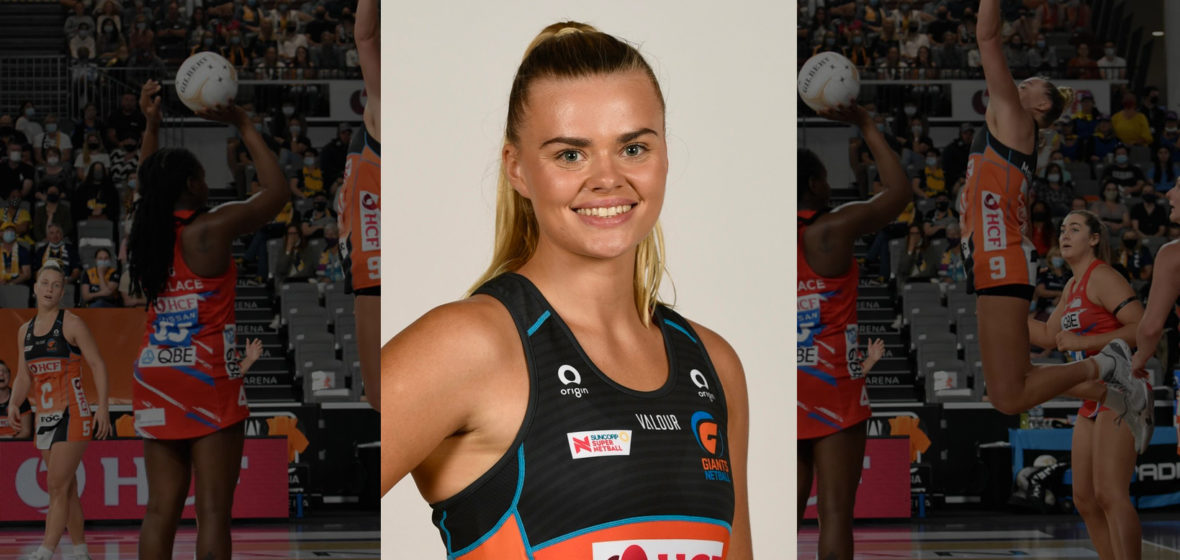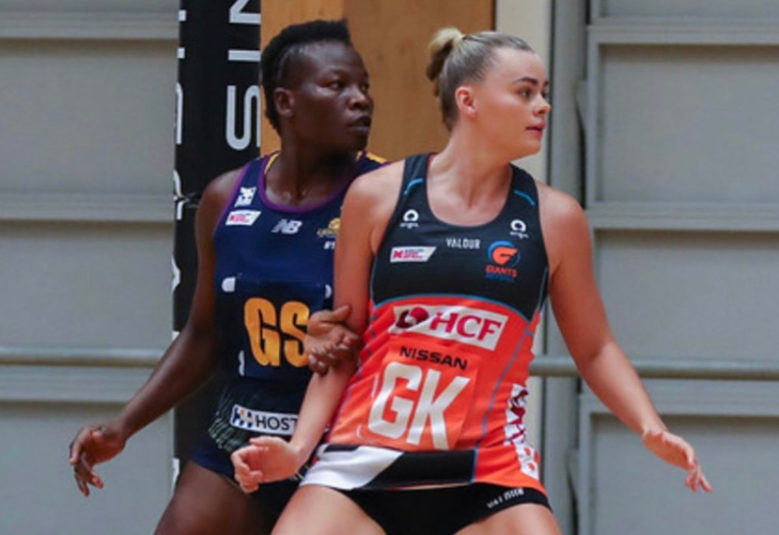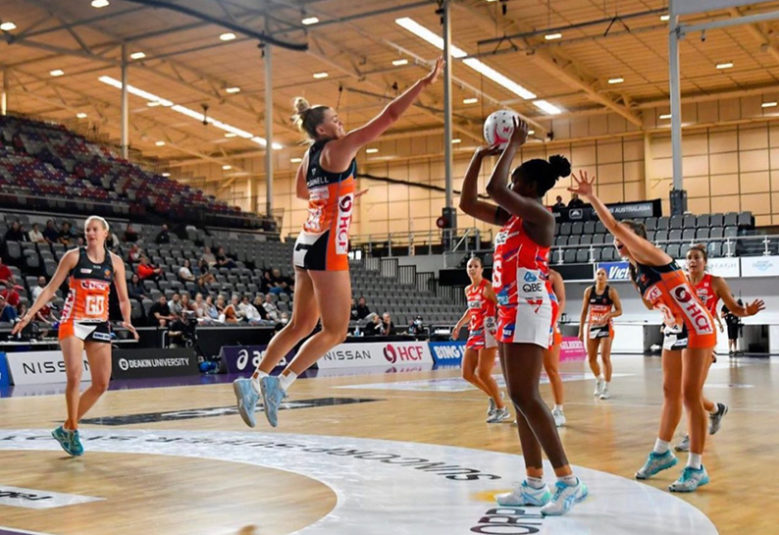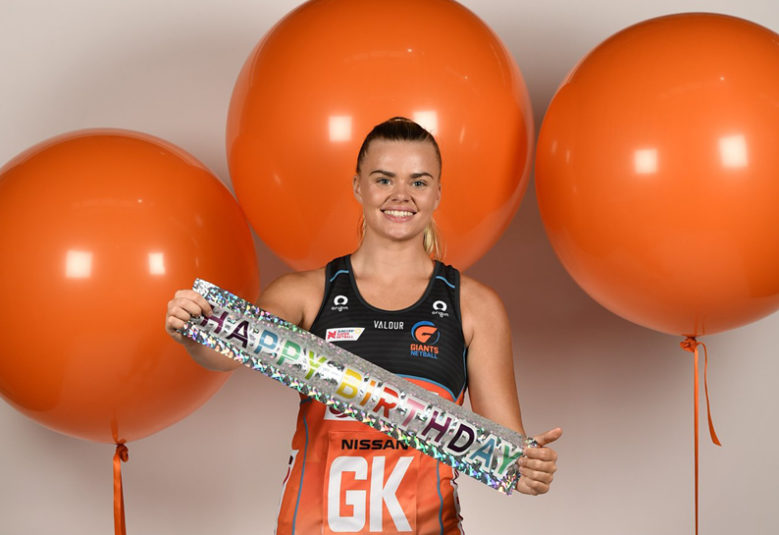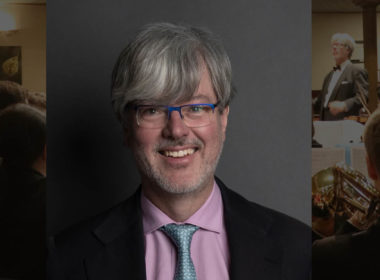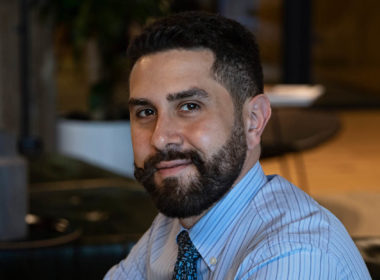Greater Western Sydney (GWS) Giants netball star Matilda “Tilly” McDonell might wear a defender’s bib on the court – but that isn’t holding her back from attacking other goals. She reveals how she survived the COVID-19-plagued Super Netball season, and why she is driven to study law at the same time as a professional sporting career.
Celebrations of milestones like weddings, anniversaries and birthdays have looked different for most people during the COVID-19 pandemic. For professional netballer and law student Tilly McDonell, her 21st birthday surprise was about as unexpected as the introduction of the new two-point scoring shot in the Super Netball this season.
“I literally went into the [GWS Giants] hub on my birthday,” she tells LSJ.
“I was living life, getting ready for my 21st birthday on Saturday night. My best mate and I were just grabbing coffee, having brekkie, and next minute the COVID-19 announcement hit. We had three hours to quickly go home, pack our stuff and get on a plane. It was so full on.”
McDonell and her GWS teammates were initially happy to tolerate what they thought would be a short stint in the sporting hub environment that had been trialled and became standard for AFL and NRL players – and netballers had tasted for a few weeks – last year. Players and coaching staff live and train in hotels in states with low COVID-19 case numbers; separated from members of the public, ensuring no contact with anyone outside the hub.
The Giants – like many Sydneysiders – assumed the lockdown would be short. They’d return to their home facilities at Sydney Olympic Park, and life would go back to normal in a few weeks. Delta’s impact only became real when the team had to relocate multiple times as different states and cities ducked in and out of lockdown. The squad flew between Melbourne, the Gold Coast, Brisbane, Adelaide, and the Sunshine Coast.
At one point, the team had to test and isolate every player and staff member after an exposure site scare in Adelaide. Late in the season, the team even became caught up in Australia’s ugly interstate border rows and was shut out from Western Australia while mid-flight to Perth.
Operations manager of the GWS Giants, Denny Peacock, told media in August, “there’s been tears, there’s been stress but nothing that we haven’t got through.”
“We were away for three months, it’s been full on,” McDonell admits. “We aren’t cricketers, we don’t usually go away for that long. Our usual schedule is a week at home and then a week away – and we play on weekends. So, it’s definitely been an experience.”
McDonell is speaking to LSJ in September, one day after returning home to her parents’ house in the Hawkesbury north-west of Sydney. She’s been away since June. She says she’s “knackered” but also hints at the hub potentially offering a paradoxical competitive advantage. After all, two Sydney teams – the GWS Giants and NSW Swifts – beat out teams from all other states to remain standing at the end of the season and compete for the Grand Final in Brisbane.
The cross-town rivals headed into the decider in August with the same number of wins, losses and goals on their season score sheets. In the end, the Swifts took out the cup for the second time in three years, beating GWS 63-59.
“Coming off the hubs from last year, we were really well educated and prepared for how to approach it. This year we had a little more experience and the vibe in the team was really good,” McDonell says. “We put it all out there, and unfortunately our opponents were just the better team on the day. I think this will put more fire in the belly [for next season]. We’ve got all the ingredients, we’ve got the best coaches in the league, and trainers and staff.”
“There aren’t enough female voices in [the conditions and pay] space – and not enough support for female athletes”
A Greater Western Sydney woman through-and-through, McDonell grew up in Sydney’s bushy outer suburbs and stomping the black asphalt netball courts of Londonderry Netball Club in the Hawkesbury Netball Association. She excelled in basketball, athletics and even rugby union in her childhood, admitting she was “so much taller and stronger than everyone else in my age group”. But she ultimately switched codes to netball when she discovered it was faster and more athletic than rugby. (While explaining this, McDonell adds the no-contact rule in netball is a complete misnomer.) Coaches put her in defence because she could intercept passes and deflect shots so well – and she’s dominated that side of the court since.
“Am I an aggressive competitor?” the 185cm defender laughs, “well, I get a bit of white-line fever and tend to put everything out there when I play.”
That competitive streak saw her play 12 games for the Giants in the Super Netball this season, with 17 deflections, six intercepts and five general play turnovers. It also might come in handy one day when she retires from netball and potentially tries her hand at her other talent – law. McDonell was drafted to the Giants aged 19 and in the same year, began a law degree at UNSW in Sydney under a scholarship program for elite athletes. She says she’s keen to use her legal knowledge to leverage better conditions, recognition and pay for women in sport.
“There aren’t enough female voices in that space – and not enough support for female athletes,” she says. “Even looking at what has recently happened with the NRL women, I’d like to be there negotiating those contracts.”
The NRLW season was cancelled in the days before McDonell and I speak, with administrators citing the cost of relocating teams into hubs as being prohibitively high. This was despite the NRL paying for a far greater number of male players and their families to relocate to Queensland for a longer season.
“It’s frustrating to see the men continue to get precedence over women [in sport]. We’re doing the same training, we’re doing the same work. We’re a professional unit. And you know that they’re getting more money and better privileges,” McDonell says.
“I think we are moving forward in terms of, we just got a new deal negotiated, and our contracts and pay have increased. But it is slow. It gets my gears grinding when I see things like that [the NRLW situation].
“If there is still work to do when I retire from netball, in equality for women in sport, I’m really happy to put in that work. I feel so passionate about it.”

